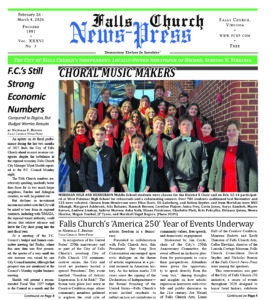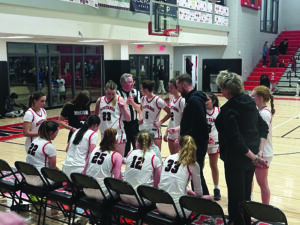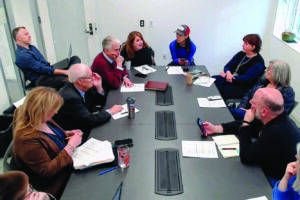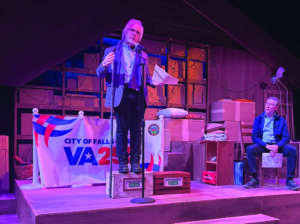Doing the math roughly, retiring U.S. State Sen. Mary Margaret Whipple estimated she’d made 1,000 of those usually-grueling drives from her Arlington home down I-95 for two hours to the Virginia state capital building in Richmond to carry out her considerable duties as one of the state’s most valued legislators for 16 years.
Whipple has represented the 31st State Senate district representing mostly North Arlington and the City of Falls Church since first being elected in 1995. Her district has had the privilege of being represented by one who also served for 12 years as the chairman of the Senate Democratic Caucus, her party’s the most powerful post in the entire State Senate. She is the first woman to hold such a leadership position ever in the Virginia General Assembly.
A very familiar face throughout her district for all those years, Whipple attended all the obligatory public events – from the Falls Church Memorial Day Parade to the Fall Festival, to Democratic Party events of myriad kinds, to multiple town halls every year, to appearances before local government bodies, including the Falls Church City Council, every year to listen, interact and carry legislative requests to Richmond.
She has been hailed by most in this area, Democrats and Republicans alike, for her intelligence, attentiveness, attention to detail and gracious demeanor, and many believe the state will suffer a significant loss from her decision last year not to seek re-election to a fifth four-year term last month.
Whipple, who celebrated her 50th anniversary with her husband, Tom, in 2010, told the News-Press in an interview at her home last week that she came to decision last spring not to seek another term, after thinking it over for a long time before that.
“Running again would mean committing to another four full years, and that just seemed daunting,” she said. She leaves a career of 35 years in public service, beginning in 1976 when, as a community activist for five previous years, she was appointed to fill a vacancy on the Arlington County school board.
She served until 1980, including as chair in 1978-79, leaving the board after an unsuccessful bid for election to the Arlington County Board. She ran again for that job in 1982 and won, serving on the board until 1995, including as its chair in 1986, when she decided to run for the 31st District State Senate seat being vacated by Sen. Ed Holland.
Asked what she’d miss most about her 16 years in Richmond, she quipped, “I’ll tell you what I won’t miss, the drive down there.”
She noted that there are 170,000 miles logged on her car that she’s had only five years, while acknowledging that a lot was not just the 120 mile run to Richmond and back, usually in very heavy traffic often taking two and a half hours. A lot also came from traveling around the massive state in support of other Democratic lawmakers and candidates, as she led her party’s statewide campaign efforts last fall.
During periods when the state legislature was in session, from the beginning of January to the end of February and again at a “veto session” in April, Whipple would characteristically drive down on a Sunday night and drive back on a late Friday afternoon. There were plenty of special sessions and committee sessions tacked on all year ’round, as well.
While she intends to drive down to see her successor, State Sen.-elect Barbara Favola, sworn in next month, she is expecting her drives to Richmond to tail off dramatically.
Asked about how active she intends to remain in politics, she quipped, “I intend to reduce, not replace stress.” She will, she said, focus now on the Arlington Community Foundation and at her local Presbyterian church, where she is a deacon. She has also accepted a position on the board the Alliance of Housing Solutions and will continue to be involved with the National Caucus of Environmental Legislators.
Born May 26, 1940 in Watseka, Illinois, Whipple grew up in College Station, Texas, her father being a chairman of the English department at Texas A&M. She met her future husband, Tom, and married him at the end of her sophomore year at Rice University in Houston.
She earned her B.A. In English at American University and M.A. in American Studies at George Washington U. After a two-year stint in London, she moved back to the D.C. area in 1964, and she and Tom bought their North Arlington home in 1965, where they have resided to the present day. The couple had two daughters and now five grandchildren.
Sen. Whipple worked at the U.S. Office of Education and at part-time at the Northern Virginia Community College before launching her career in elected public service.
Her biggest achievements legislatively? She said it was in environmental areas, singling out her Non-Title Wetlands Act against big business interests that she marshaled with a GOP House patron in 2000.
Additionally, she’s tried hardest to win passage of a Housing Trust Fund law to create a dedicated funding stream for affordable housing, but was never able to get it through. She’s also pushed at efforts to open up voter participation in a variety of ways.
Whipple has prided herself on an ability to forge a unified Democratic caucus in the State Senate even as many Democrats from the southern parts of Virginia are much more conservative than those like herself from the north.
“It was a challenge, but we all looked out for one another,” she said, “and all helped others who needed it.” There unified efforts won Democratic control of the Senate in 2007, which will go back to GOP control (technically, 20-20 with a GOP lieutenant governor tie-breaker).
Asked what a young person should do to get involved as a lawmaker, Whipple said it is of primary importance to “be involved in the community” one seeks to represent. “Those most successful are those who’ve had a background, who’ve established trust at their base.”
Next, she said, it is important to understand different viewpoints, and to find a common ground. “Develop the ability to be persuasive, and be practical and able to explain in ways that can be understood easily,” she said.
“I am not ideological,” she said, although the lamented that “collegiality is slipping away” in government lately. “Not all issues are partisan. Just because a bill is introduced by a Democrat doesn’t necessarily mean it is a Democratic bill.”
“There is a lot of opinion that passes for news these days,” she commented. “It needs to be recognized for what it is. Effective governing begins with the effort to work from the same set of facts.”













